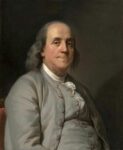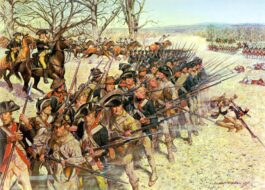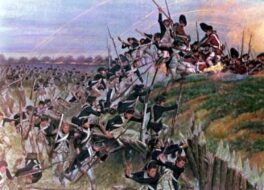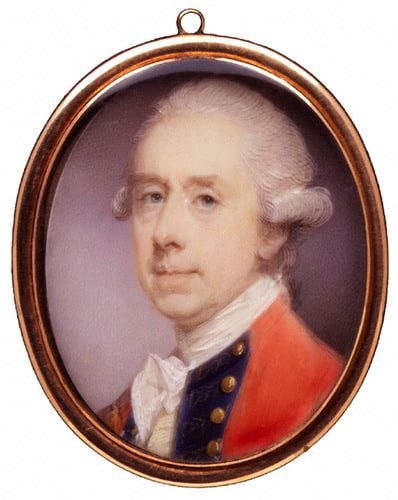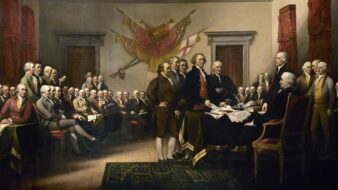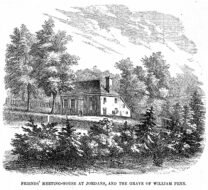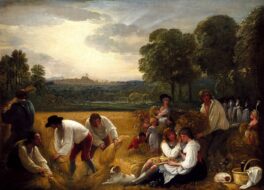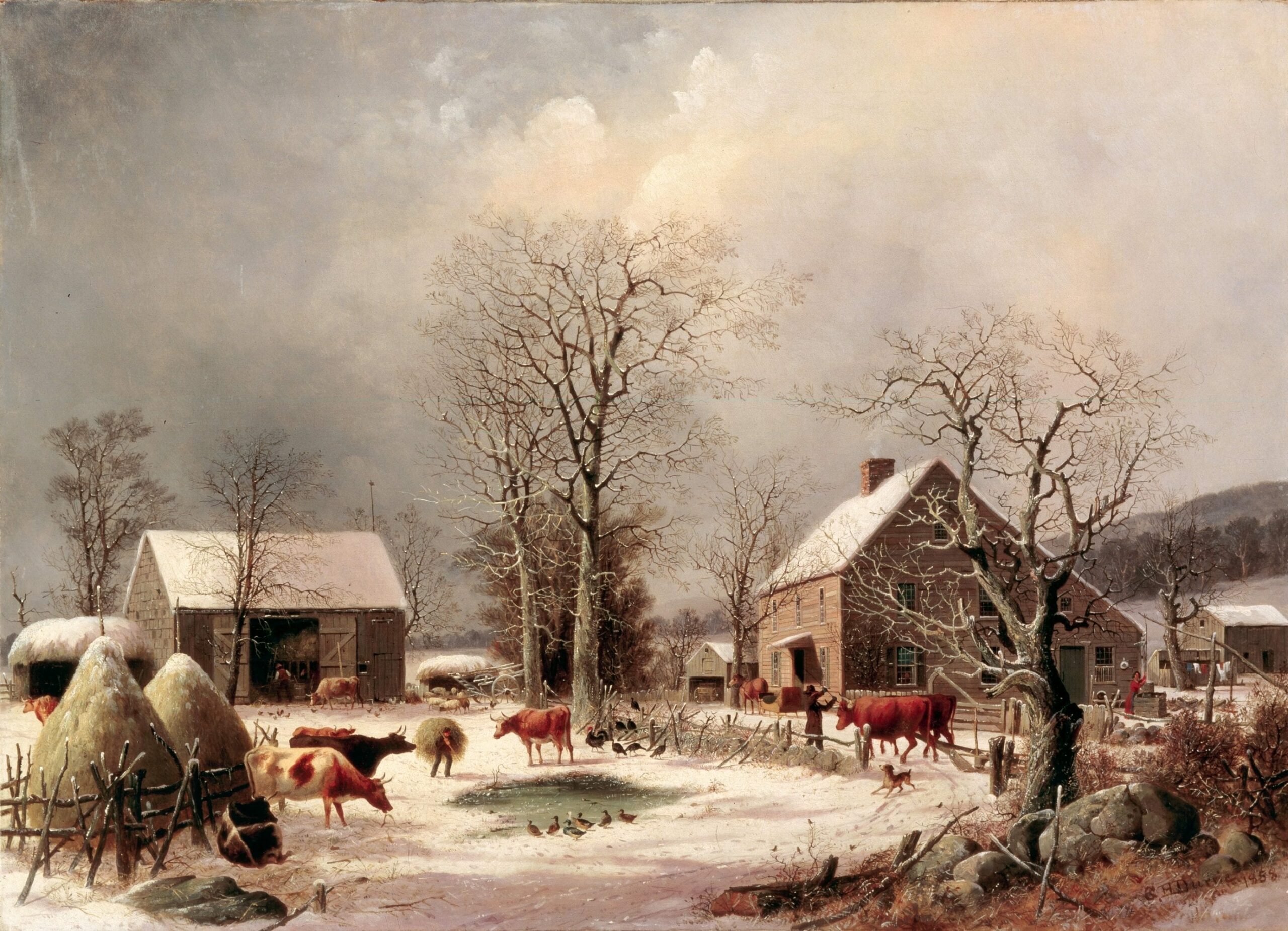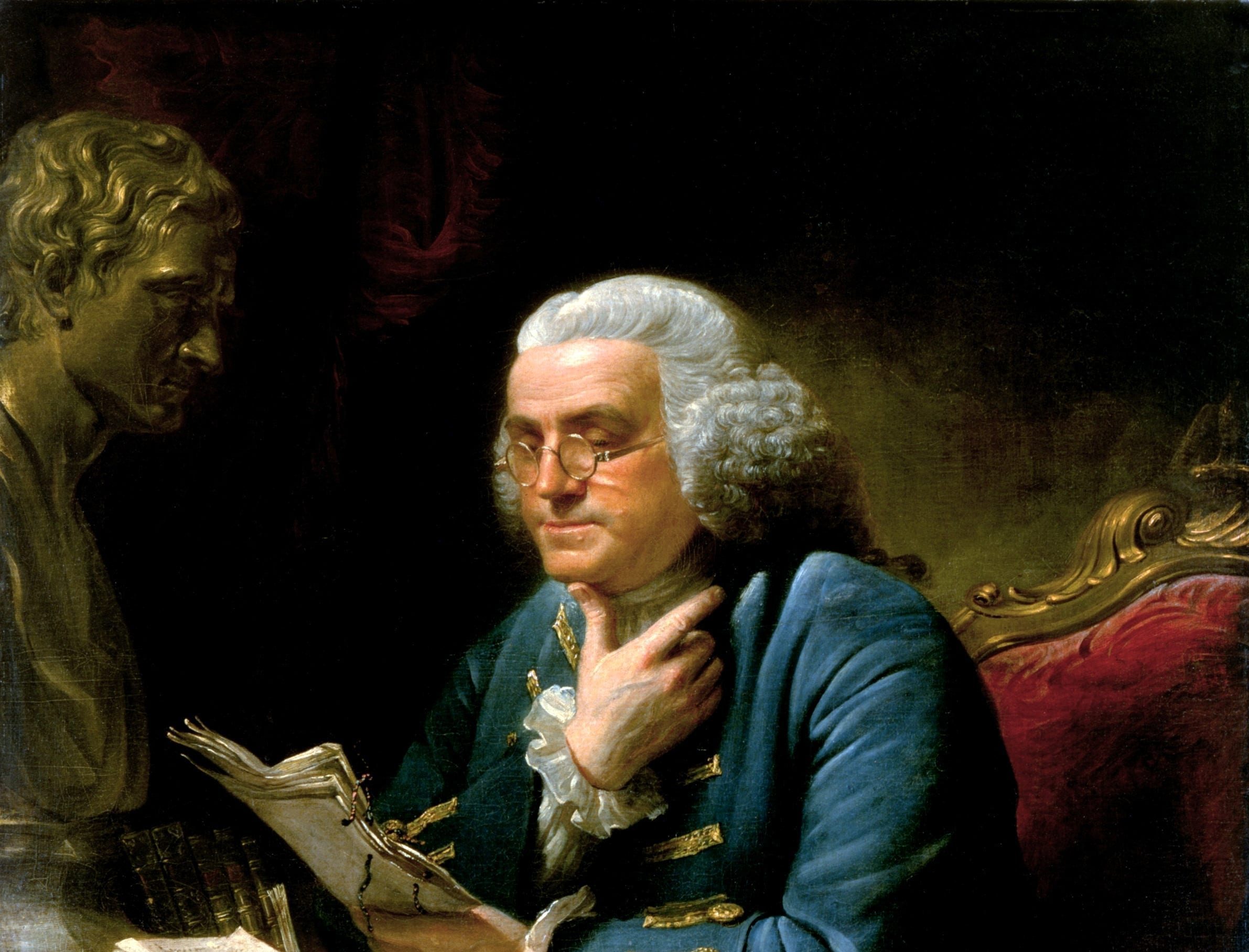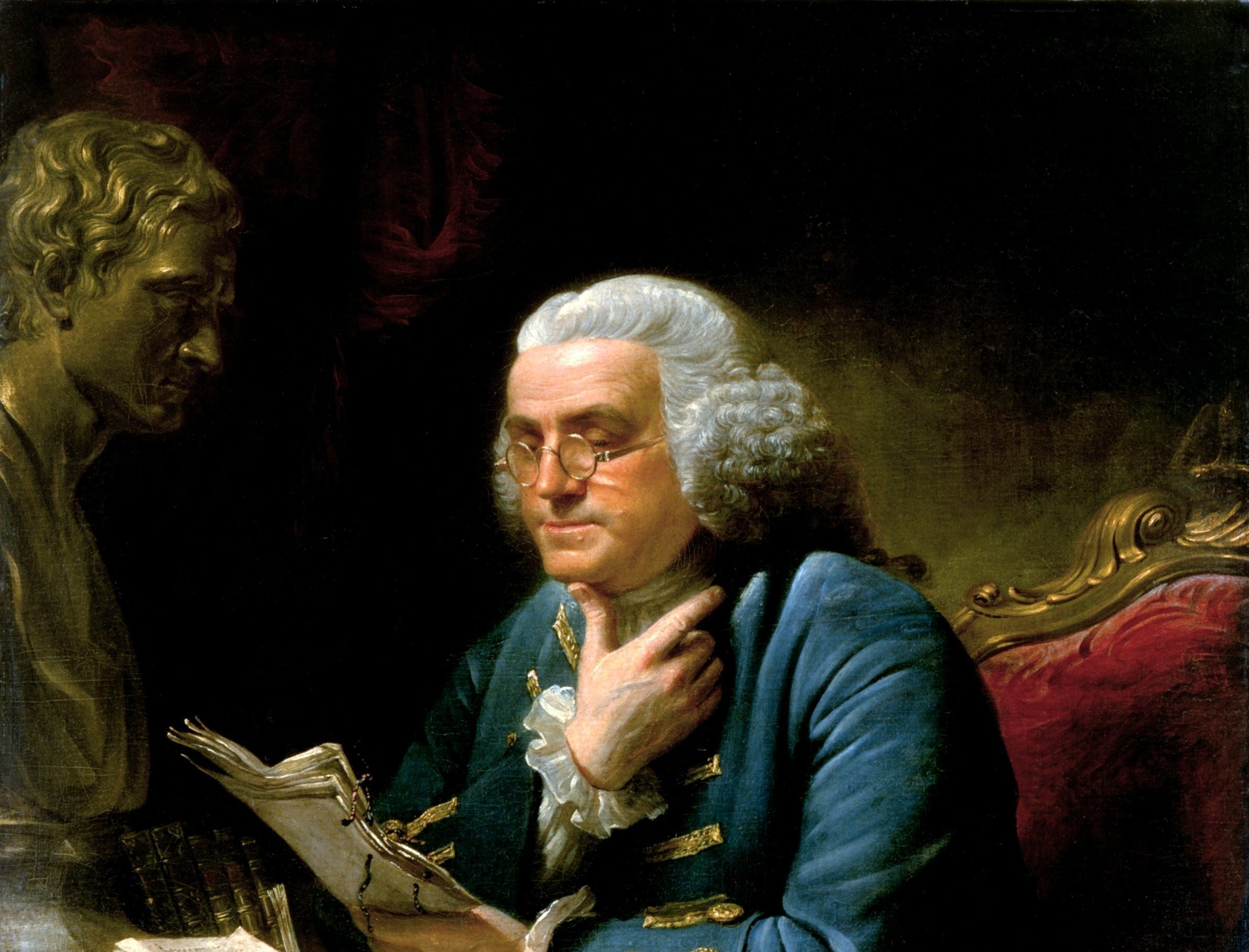
No study questions
No related resources
SECTION 1. The commonwealth or state of Pennsylvania shall be governedhereafter by an assembly of the representatives of the freemen of the same, and a president and counil, in manner and form following-
SECT. 2. The supreme legislative power shall be vested in a house of representatives of the freemen of the commonwealth or state of Pennsylvania.
SECT. 3. The supreme executive power shall be vested in a president and council.
SECT. 4. Cours of justice shall be established in the city of Philadelphia and in every county of this state.
SECT. 5. The freemen of this commonwealth and their sons shall be trained and armed for its defence under such regulations, restrictions, and exceptions as the general assembly shall by law direct, preserving always to the people the right of choosing their colonels and all commissioned officers under that rank, in such manner and as often as by the said laws shall be directed.
SECT. 6. Every freeman of the full age of twenty-one years, having resided in this state for the space of one whole year before the day of election for representatives, and paid public taxes during that time, shall enjoy the right of an elector: Provided always, that sons of freeholders of the age of twenty-one years shall be intitled to vote although they have not paid taxes.
SECT. 7. The house of representatives of the freemen of this commonwealth shall consist of persons most noted for wisdom and virtue, to be chosen by the freemen of every city and county of this commonwealth respectively. And no person shall be elected unless he has resided in the city or county for which he has chosen two years immediately before the said election; nor shall any member, while he continues such, hold any other office, except in the militia.
SECT. 8. No person shall be capable of being elected a member to serve in the house of representatives of the freemen of this commonwealth more than four years in seven.
SECT. 9. The members of the house of representatives shall be chosen annually by ballot, by the freemen of the commonwealth, on the second Tuesday in October forever, (except this present year,) and shall meet on the fourth Monday of the same month, and shall be stiled, The general assembly of the representatives of the freemen of Pennsylvania, and shall have power to choose their speaker, the treasurer of the state, and their other officers; sit on their own adjournments; prepare bills and enact them into laws; judge of the elections and qualifications of their own members; they may expel a member, but not a second time for the same cause; they may administer oaths or affirmations on examination of witnesses; redress grievances; impeach state criminals; grant charters of incorporation; constitute towns, boroughs, cities, and counties; and shall have all other powers necessary for the legislature of a free state or commonwealth: But they shall have no power to add to, alter, or infringe any part of this constitution…
SECT. 13. The doors of the house in which the representatives of the freemen of this state shall sit in general assembly, shall be and remain open for the admission of all persons who behave decently, except only when the welfare of this state may require the doors to be shut.
SECT. 14. The votes and proceedings of the general assembly shall be printed weekly during their sitting, with the yeas and nays, on any question, vote or resolution, where any two members require it, except when the vote is taken by ballot; and when the yeas and nays are so taken every member shall have a right to insert the reasons of his vote upon the minutes, if he desires it.
SECT. 15. To the end that laws before they are enacted may be more maturely considered, and the inconvenience of hasty determinations as much as possible prevented, all bills of public nature shall be printed for the consideration of the people, before they are read in general assembly the last time for debate and amendment; and, except on occasions of sudden necessity, shall not be passed into laws until the next session of assembly; and for the more perfect satisfaction of the public, the reasons and motives for making such laws shall be fully and clearly expressed in the preambles…
SECT. 17. The city of Philadelphia and each county of this commonwealth respectively, shall on the first Tuesday of November in this present year, and on the second Tuesday of October annually for the two next succeeding years, viz. the year thousand seven hundred and seventy-seven, and the year one thousand seven hundred and seventy-eight, choose six persons to represent them in general assembly. But as representation in proportion to the number of taxable inhabitants is the only principle which can at all times secure liberty, and make the voice of a majority of the people the law of the land; therefore the general assembly shall cause complete lists of the taxable inhabitants in the city and each county in the commonwealth respectively, to be taken and returned to them, on or before the last meeting of the assembly elected in the year one thousand seven hundred and seventy-eight, who shall appoint a representation to each, in proportion to the number of taxables in such returns; which representation shall continue for the next seven years afterwards at the end of which, a new return of the taxable inhabitants shall be made, and a representation agreeable thereto appointed by the said assembly, and so on septennially forever. The wages of the representatives in general assembly, and all other state charges shall be paid out of the state treasury.
SECT. 18. In order that the freemen of this commonwealth may enjoy the benefit of election as equally as may be until the representation shall commence, as directed in the foregoing section, each county at its own choice may be divided into districts, hold elections therein, and elect their representatives in the county, and their other elective officers, as shall be hereafter regulated by the general assembly of this state. And no inhabitant of this state shall have more than one annual vote at the general election for representatives in assembly.
SECT. 19. For the present the supreme executive council of this state shall consist of twelve persons chosen in the following manner: The freemen of the city of Philadelphia, and of the counties of Philadelphia, Chester, and Bucks, respectively, shall choose by ballot one person for the city, and one for each county, to serve for three years and no longer, at the time and place for electing representatives in general assembly. The freemen of the counties of Lancaster, York, Cumberland, and Berks, shall, in like manner elect one person for each county respectively, to serve as counsellors for two years and no longer. And the counties of Northampton, Bedford, Northumberland and Westmoreland, respectively, shall, in like manner, elect one person for each county, to serve as counsellors for one year, and no longer. And at the expiration of the time for which each counsellor was chosen to serve, the freemen of the city of Philadelphia, and of the several counties in this state, respectively, shall elect one person to serve as counsellor for three years and no longer; and so on every third year forever. By this mode of election and continual rotation, more men will be trained to public business, there will in every subsequent year be found in the council a number of persons acquainted with the proceedings of the foregoing years, whereby the business will be more consistenly conducted, and moreover the danger of establishing an inconvenient aristocracy will be effectually prevented. All vacancies in the council that may happen by death, resignation, or otherwise, shall be filled at the next general election for representatives in general assembly, unless a particular election for that purpose shall be sooner appointed by the president and council. No member of the general assembly or delegate in congress, shall be chosen a member of the council. The president and vice-president shall be chosen annually by the joint ballot of the general assembly and council, of the members of the council. Any person having served as a counsellor for thre successive years, shall be incapable of holding that office for four years afterwards. Every member of the council shall be a justice of the peace for the whole commonwealth, by virtue of his office.
In case new additional counties shall hereafter be erected in this state, such county or counties shall elect a counsellor, and such county or counties shall be annexed to the next neighboring counties, and shall take rotation with such counties.
The council shall meet annually, at the same time and place with the general assembly.
The treasurer of the state, trustees of the loan office, naval officers, collectors of customs or excise, judge of the admiralty, attornies general, sheriffs, and prothonotaries, shall not be capable of a seat in the general assembly, executive council, or continental congress.
SECT. 20. The president, and in his absence the vice-president, with the council, five of whom shall be a quorum, shall have power to appoint and commissionate judges, naval officers, judge of the admiralty, attorney general and all other officers, civil and military, except such as are chosen by the general assembly or the people, agreeable to this frame of government, and the laws that may be made hereafter; and shall supply every vacancy in any office, occasioned by death, resignation, removal or disqualification, until the office can be filled in the time and manner directed by law or this constitution. They are to correspond with other states, and transact business with officers of government, civil and military; and to prepare such business as may appear to them necessary to lay before the general assembly. They shall sit as judges, to hear and determine on impeachments, taking to their assistance for advice only, the justices of the supreme court. And shall have power to grant pardons, and remit fines, in all cases whatsoever, except in cases of impeachment; and in cases of treason and murder, shall have power to grant reprieves, but not to pardon, until the end of the next sessions of assembly; but there shall be no remission or mitigation of punishments on impeachments, except by act of the legislature; they are also to take care that the laws be faithfully executed; they are to expedite the execution of such measures as may be resolved upon by the general assembly; and they may draw upon the treasury for such sums as shall be appropriated by the house: They may also lay embargoes, or prohibit the exportation of any commodity, for any time, not exceeding thirty days, in the recess of the house only: They may grant such licences, as shall be directed by law, and shall have power to call together the general assembly when necessary, before the day to which they shall stand adjourned. The president shall be commander in chief of the forces of the state, but shall not command in person, except advised thereto by the council, and then only so long as they shall approve thereof. The president and council shall have a secretary, and keep fair books of their proceedings, wherein any counsellor may enter his dissent, with his reasons in support of it…
SECT. 22. Every officer of state, whether judicial or executive, shall be liable to be impeached by the general assembly, either when in office, or after his resignation or removal for mal-administration: All impeachments shall be before the president or vice-president and council, who shall hear and determine the same.
SECT. 23. The judges of the supreme court of judicature shall have fixed salaries, be commissioned for seven years only, though capable of reappointment at the end of that term, but removal for misbehaviour at any time by the general assembly; they shall not be allowed to sit as members in the continental congress, executive council, or general assembly, nor to hold any office civil or military, nor to take or receive fees or perquisites of any kind…
SECT. 25. Trials shall be by jury as heretofore: And it is recommended to the legislature of this state, to provide by law against every corruption or partiality in the choice, return, or appointment of juries.
SECT. 26. Courts of sessions, common pleas, and orphans courts shall be held quarterly in each city and county; and the legislature shall have power to establish all such other courts as they may judge for the good of the inhabitants of the state. All courts shall be open, and justice shall be impartially administered without corruption or unnecessary delay: All their officers shall be paid an adequate but moderate compensation for their services: And if any officer shall take greater or other fees than the law allows him, either directly or indirectly, it shall ever after disqualify him from holding any office in this state…
SECT. 28. The person of a debtor, where there is not a strong presumption of fraud, shall not be continued in prison, after delivering up, bona fide, all his estate real and personal, for the use of his creditors, in such manner as shall be hereafter regulated by law. All prisoners shall be bailable by sufficient sureties, unless for capital offences, when the proof is evident, or presumption great.
SECT. 29. Excessive bail shall not be exacted for bailable offences: And all fines shall be moderate.
SECT. 30. Justices of the peace shall be elected by the freeholders of each city and county respectively…
SECT. 31. Sheriffs and coroners shall be elected annually in each city and county, by the freemen…
SECT. 35. The printing presses shall be free to every person who undertakes to examine the proceedings of the legislature, or any part of government.
SECT. 36. As every freeman to preserve his independence, (if without a sufficient estate) ought to have some profession, calling, trade or farm, whereby he may honestly subsist, there can be no necessity for, nor use in establishing offices of profit, the usual effects of which are dependence and servility unbecoming freemen, in the possessors and expectants; faction, contention, corruption, and disorder among the people. But if any man is called into public service, to the prejudice of his private affairs, he has a right to a reasonable compensation: And whenever an office, through increase of fees or otherwise, becomes so profitable as to occasion many to apply for it, the profits ought to be lessened by the legislature.
SECT. 37. The future legislature of this state, shall regulate intails in such a manner as to prevent perpetuities.
SECT. 38. The penal laws as heretofore used shall be reformed by the legislature of this state, as soon as may be, and punishments made in some cases less sanguinary, and in general more proportionate to the crimes.
SECT. 39. To deter more effectually from the commission of crimes, by continued visible punishments of long duration, and to make sanguinary punishments less necessary; houses ought to be provided for punishing by hard labour, those who shall be convicted of crimes not capital; wherein the criminals shall be imployed for the benefit of the public, or for reparation of injuries done to private persons: And all persons at proper times shall be admitted to see the prisoners at their labour…
SECT. 41. No public tax, custom, or contribution shall be imposed upon, or paid by the people of this state, except by a law for that purpose: And before any law be made for raising it, the purpose for which any tax is to be raised ought to appear clearly to the legislature to be of more service to the community than the money would be, if not collected; which being well observed, taxes can never be burthens.
SECT. 42. Every foreigner of good character who comes to settle in this state, having first taken an oath or affirmation of allegiance to the same, may purchase, or by other just means acquire, hold, and transfer land or other real estate; and after one year’s residence, shall be deemed a free denizen thereof, and entitled to all the rights of a natural born subject of this state, except that he shall not be capable of being elected a representative until after two years residence…
SECT. 44. A school or schools shall be established in each county by the legislature, for the convenient instruction of youth, with such salaries to the masters paid by the public, as may enable them to instruct youth at low prices: And all useful learning shall be duly encouraged and promoted in one or more universities.
SECT. 45. Laws for the encouragement of virtue and prevention of vice and immorality, shall be made and constantly kept in force, and provision shall be made for their due excution: And all religious societies or bodies of men heretofore united or incorporated for the advancement of religion or learning, or for other pious and charitable purposes, shall be encouraged and protected in the enjoyment of the privileges, immunities and estates which they were accustomed to enjoy, or could of right have enjoyed, under the laws and former constitution of this state…
SECT. 47. In order that the freedom of the commonwealth may be preserved inviolate forever, there shall be chosen by ballot by the freemen in each city and county respectively, on the second Tuesday in October, in the year one thousand seven hundred and eighty-eight, and on the second Tuesday in October, in every seventh year thereafter, two persons in each city and county of this state, to be called the COUNCIL OF CENSORS; who shall meet together on the second Monday of November next ensuing their election; the majority of whom shall be a quorum in every case, except as to calling a convention, in which two-thirds of the whole number elected shall agree: And whose duty it shall be to enquire whether the constitution has been preserved inviolate in every part; and whether the legislative and executive branches of government have performed their duty as guardians of the people, or assumed to themselves, or exercised other or greater powers than they are intitled to by the constitution: They are also to enquire whether the public taxes have been justly laid and collected in all parts of this commonwealth, in what manner the public monies have been disposed of, and whether the laws have been duly executed. For these purposes they shall have power to send for persons, papers, and records; they shall have authority to pass public censures, to order impeachments, and to recommend to the legislature the repealing such laws as appear to them to have been enacted contrary to the principles of the constitution. These powers they shall continue to have, for and during the space of one year from the day of their election and no longer: The said council of censors shall also have power to call a convention, to meet within two years after their sitting, if there appear to them an absolute necessity of amending any article of the constitution which may be defective, explaining such as may be thought not clearly expressed, and of adding such as are necessary for the preservation of the rights and happiness of the people: But the articles to be amended, and the amendments proposed, and such articles as are proposed to be added or abolished, shall be promulgated at least six months before the day appointed for the election of such convention, for the previous consideration of the people, that they may have an opportunity of instructing their delegates on the subject…

Conversation-based seminars for collegial PD, one-day and multi-day seminars, graduate credit seminars (MA degree), online and in-person.
